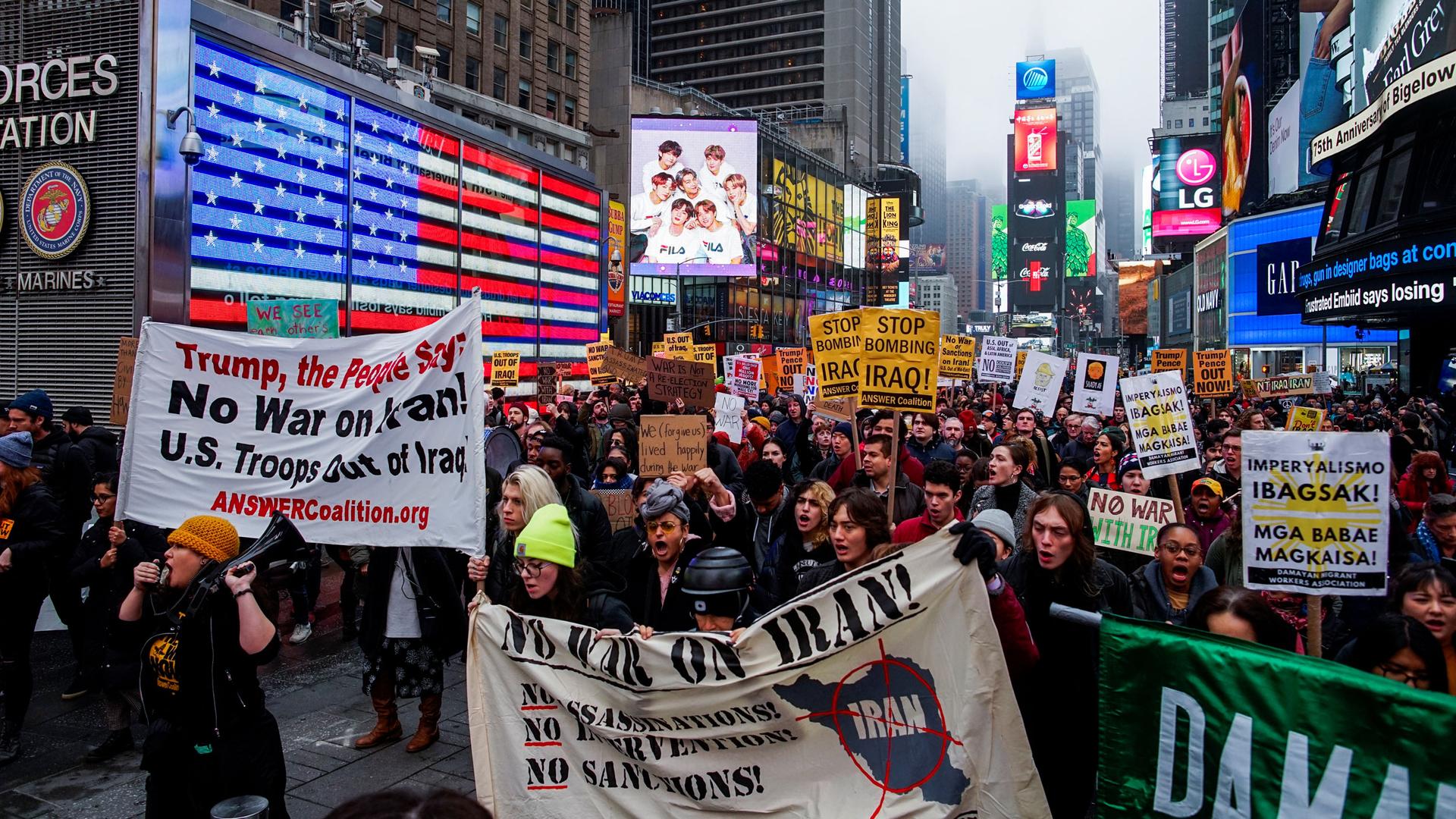Escalating conflict with Iran: What’s happening?
People march as they take part in an anti-war protest amid increased tensions between the United States and Iran at Times Square in New York, Jan. 4, 2020.
The US assasination of Iran’s top general, Qasem Soleimani, has escalated a “shadow war” in the Middle East between the US and Iran.
Soleimani was killed in a targeted, Jan. 3 airstrike near Baghdad International Airport in Iraq. His death has brought about massive demonstrations against the US and a warning that Iran will retaliate.
Related: US strike kills top Iranian commander Soleimani
“God the Almighty has promised to take martyr Soleimani’s revenge,” Gen. Esmail Ghaani, Soleimani’s successor as commander of the Quds Force, told Iranian state television. “Certainly, actions will be taken.”
US President Donald Trump authorized the airstrike against Soleimani without congressional approval, citing “imminent and sinister attacks.”
While Republicans largely united behind the president’s actions, many Democratic politicians raised concerns over what consequences the assassination will have, particularly the threat to Americans abroad and the likelihood of sparking another war in the Middle East.
Related: Killing Soleimani was a ‘hasty’ decision, says former defense undersecretary
This escalation doesn’t come without a backstory. The US-Iran relationship has faced many ups and downs over the past century. More recent tensions have risen after Trump walked away from the Iran nuclear deal and reimposed crippling sanctions on the country in 2018. The United States has also grown increasingly concerned about Iran’s influence in Iraq, the government of which has faced months of popular protest.
How did we get here, and what’s happening next? The World is tracking recent developments in this timeline, which will continue to be updated.
Related: The history of US-Iran relations: A timeline
Jan. 16: Countries of crash victims ask for investigation, compensation
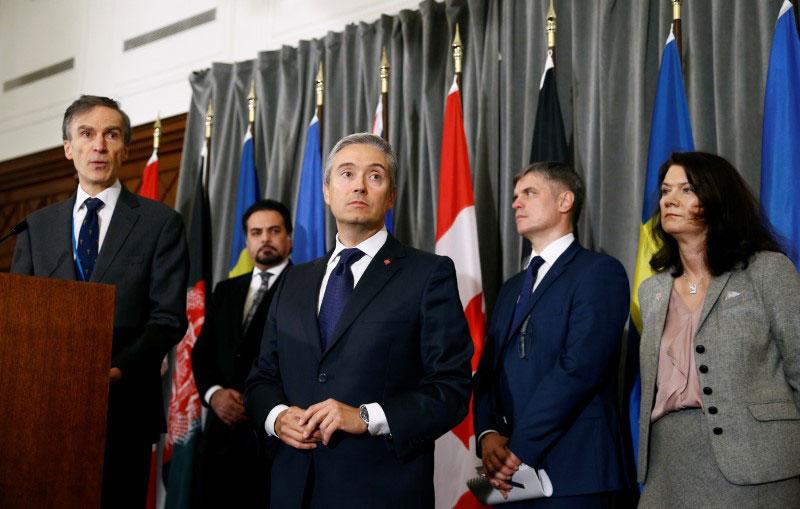
Five countries whose citizens died when Iran shot down an airliner Jan. 8 say that Tehran should pay compensation to families of the victims, and warn that the world is watching for its response.
Canada, Ukraine, Sweden, Afghanistan and Britain said Iran should hold a “thorough, independent and transparent international investigation open to grieving nations,” in a statement issued after a meeting of officials in London.
Jan. 15: Iran rejects notion of ‘Trump deal’
Iranian President Hassan Rouhani dismisses a proposal for a new “Trump deal” aimed at resolving a nuclear row, saying it was a “strange” offer and criticizing Trump for always breaking promises.
British Prime Minister Boris Johnson, who has praised Trump as a great dealmaker, called on Tuesday for the president to replace Iran’s 2015 nuclear deal with major powers with his own new pact to ensure Tehran does not get an atomic weapon.
Jan. 14: European allies trigger JCPOA dispute mechanism
France, Britain and Germany formally trigger the dispute mechanism in Iran’s nuclear deal, the strongest step the Europeans have taken so far to enforce an agreement that requires Iran to curb its nuclear program.
In a statement, the Europeans said they still want the nuclear deal to succeed and were not joining a “maximum pressure” campaign against Iran by the United States, which abandoned the deal in 2018 and has reimposed crippling economic sanctions.
Triggering the dispute mechanism amounts to formally accusing Iran of violating the terms of the agreement and could lead eventually to the reimposition of UN sanctions lifted under the deal.
Iran has gradually rolled back its commitments under the accord since the United States quit. Tehran argues that it has the right to do so because of Washington’s actions. Foreign ministry spokesman Abbas Mousavi dismissed the “completely passive action” of the three countries and said Iran would support any act of “goodwill and constructive effort” to save the agreement.
Jan. 13: Continuing protests
Protesters denouncing Iran’s clerical rulers continue in a third day of demonstrations after authorities acknowledged shooting down a passenger plane by accident. Some activists appear to have been met by a violent crackdown by authorities. Video from inside Iran shows students chanting slogans including “Clerics get lost!” outside universities in the cities of Isfahan and in Tehran, where riot police are filmed positioning themselves on the streets.
Images from the previous two days of protests showed wounded people being carried out of demonstrations and pools of blood on the ground. Gunshots could be heard, although the police denied opening fire.
Iran’s authorities killed hundreds of protesters in November in what appears to have been the bloodiest crackdown on anti-government unrest since 1979. Sanctions imposed by the Trump administration have hammered the Iranian economy.
Related: Iranians react as government admits it shot down UIA flight
Jan. 12: Esper says no specific evidence Iran was plotting to attack four US embassies
US Defense Secretary Mark Esper on Sunday says he did not see specific evidence from intelligence officials that Iran was planning to attack four US embassies, an assertion made by Trump in justifying the killing of Iran’s top general. Trump said on Friday Iran probably had targeted the US Embassyin Baghdad and was aiming to attack four US embassies before Soleimani was killed in a US drone strike on Jan. 3.
Jan. 11: Iran admits role in plane crash
Iran admits culpability in the Jan. 8 Ukraine International Airlines crash, saying it had accidentally shot down the passenger jet and blamed human error.
Iranian public anger, rumbling for days as Iran repeatedly denied it was to blame for the plane crash, erupts into protests after the military admits its role.
Jan. 10: Sanctions imposed
The United States imposes more sanctions on Iran in retaliation for its missile attack on US forces in Iraq and vows to tighten the economic screws if Tehran continues “terrorist” acts or pursues a nuclear bomb.
The targets of the sanctions include Iran’s manufacturing, mining and textile sectors, as well as senior Iranian officials who Washington says were involved in the Jan. 8 attack on military bases housing US troops.
Washington spurns an Iraqi request to prepare to pull out US troops and says it is exploring a possible expansion of NATO’s presence there.
Iraqi Prime Minister Adel Abdul Mahdi made his request for preparations for a US troop withdrawal in a phone call with US Secretary of State Mike Pompeo on Thursday in line with a vote in Iraq’s parliament last week, Pompeo’s office said.
The State Department said any US delegation would not discuss the withdrawal of US troops as their presence in Iraq was “appropriate.”
Fearing an open conflict between Iran and the United States, EU foreign ministers, joined by NATO Secretary-General Jens Stoltenberg, hold a rare emergency meeting to call for calm.
EU foreign ministers back away from any immediate response to Iran’s decision to intensify its enrichment of uranium, instead repeating their call for Tehran to respect the limits of a 2015 nuclear arms control accord.
Jan. 9: War Powers resolution
The US House of Representatives votes on a resolution put forward by Congresswoman Elissa Slotkin, limiting the president’s powers in acting against Iran.
“To protect American lives and values, we are passing today a War Powers resolution to limit the president’s military actions,” Speaker Nancy Pelosi said in a Thursday press conference ahead of the vote. “The administration must de-escalate and must prevent further violence. America and the world cannot afford war.”
Cabinet officials informed Congress in a Jan. 8 briefing that the 2002 Authorization for the Use of Military Force against Iraq was part of the authorization for the Soleimani assassination. But whether the 2002 AUMF applies to killing a top Iranian leader, even if the strike took place in Iraq, is being questioned by lawmakers and analysts. Pelosi notes at the press conference that an AUMF should address timing, geography and scope, and would need to be updated and rewritten to be specific to the situation.
Pelosi adds that Soleimani was a threat to the US. “We have no illusions about Iran, no illusions about Soleimani. He was a terrible person, did bad things. But it’s not about how bad they are, it’s about how good we are,” she said. “I’ll not have us producing again and again generations of veterans who are suffering.”
Evidence mounts that Ukraine International Airlines PS752 was shot down by Iran with a Russian-made surface-to-air missile.
Jan. 8: Iran fires missles
In the early hours of Jan. 8 (local time), Iranian forces fire missiles at military bases housing US troops in Iraq in retaliation for the killing of Qasem Soleimani, raising the stakes in its conflict with Washington amid concerns of a wider war in the Middle East.
Iran’s supreme leader, Ayatollah Ali Khamenei, addressing a gathering of Iranians chanting “Death to America,” says the attacks are a “slap on the face” of the United States and that US troops should leave the region.
Tehran’s foreign minister says Iran took “proportionate measures” in self-defense and did not seek to escalate the confrontation.
Trump gives an initial response on Twitter in Washington Tuesday night. (Eastern Standard Time is 8 hours and 30 minutes behind Tehran and 7 hours behind Baghdad.)
At an 11:30 a.m. EST press conference, the president delivers additional remarks flanked by officials including Vice President Mike Pence and Secretary of State Mike Pompeo.
“As long as I am president of the United States, Iran will never be allowed to have a nuclear weapon,” Trump began his address. “Good morning. I’m pleased to inform you, the American people should be extremely grateful and happy. No Americans were harmed in last night’s attack by the Iranian regime.”
“Iran appears to be standing down, which is a good thing for all parties concerned and a very good thing for the world,” he added.
The president continues his statement — pointing to Iranian aggression in the region, which he says increased after the “foolish” and “very defective” Iran nuclear deal. He calls on signatories to the deal — the UK, France, Germany, Russia and China — to pursue a new deal to make the world safer and allow Iran to prosper. He also announces that he will call on NATO to become more involved in the Middle East process.
Trump touts his own economic, energy and military leadership, while criticizing the Obama administration’s efforts. He also announces “additional punishing economic sanctions on the Iranian regime” as the US “continues to evaluation options in response to Iranian aggression.”
The president ends his speech with a message to the people and leaders of Iran. “We want you to have a future and a great future. One that you deserve. One of prosperity at home and harmony with the nations of the world. The United States is ready to embrace peace with all who seek it.”
Congressional briefings regarding the death of Soleimani are heavily criticized Jan. 8 by Democratic and some Republican lawmakers, who say they lack important information.
Sen. Mike Lee (R-Utah) tells reporters it was “probably the worst briefing I’ve seen, at least on a military issue, in the nine years I’ve served in the US Senate.”
Ukraine International Airlines PS752 en route to Kyiv crashes soon after takeoff from Tehran’s Imam Khomeini International Airport, killing all 176 people onboard.
Jan. 7: 56 people killed during Soleimani funeral
At least 56 people are killed in a stampede as tens of thousands of mourners pack streets for the funeral of a slain Iranian military commander in his hometown of Kerman, forcing his burial to be delayed by several hours, according to Iranian state media.
Jan. 6: Soleimani funeral procession draws massive crowds
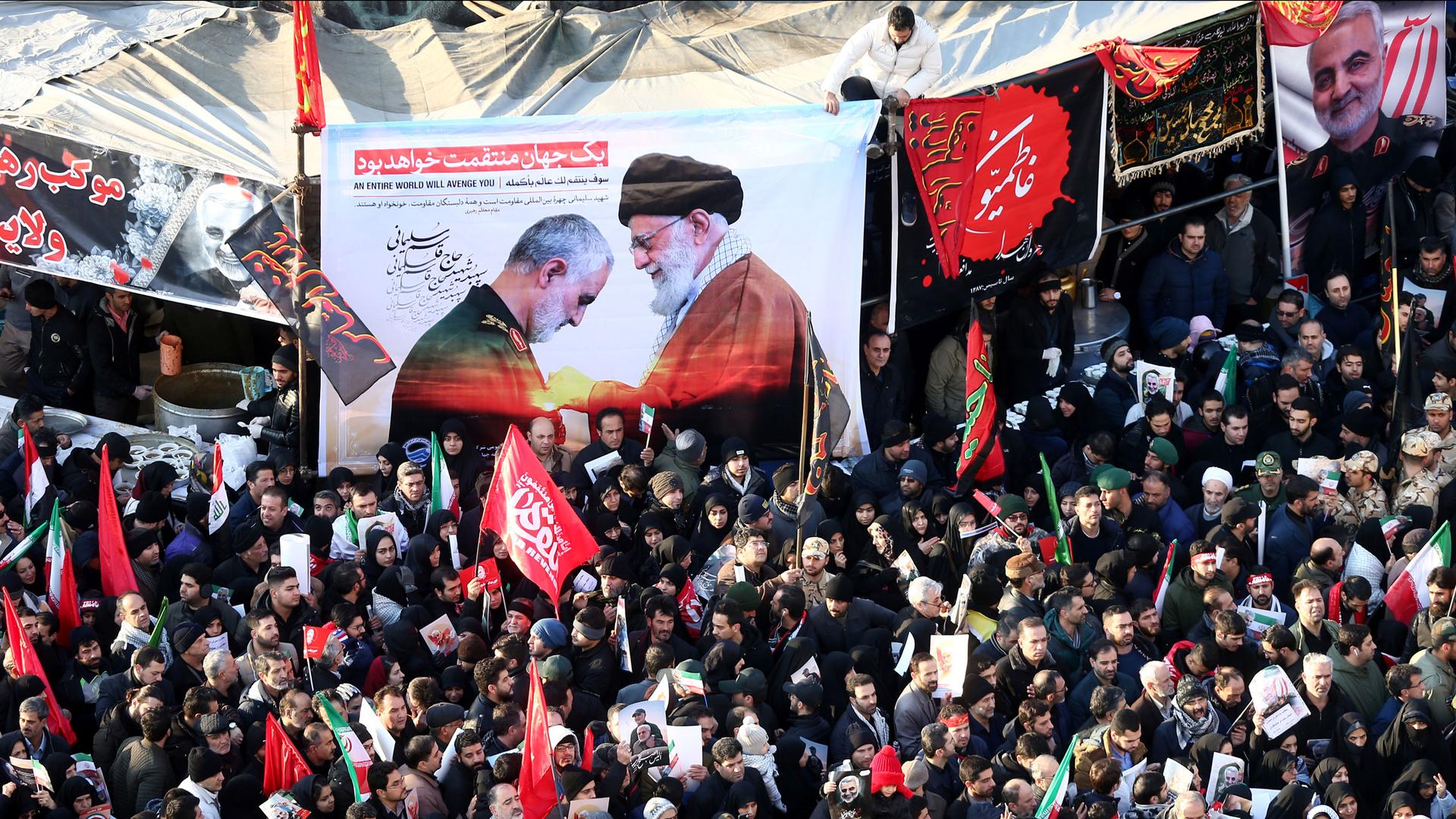
A funeral ceremony for Soleimani is held amid a massive outpouring of grief and anger in Iran. The scale of the crowds, shown on television clogging major streets, is the biggest since the 1989 funeral for the founder of the Islamic Republic, Ayatollah Ruhollah Khomeini, leader of the 1979 Iranian Revolution. Crowds chant “Death to America.”
US Defense Secretary Mark Esper contradicts Trump’s Jan. 4 threat of attacking Iranian cultural sites, which would be a violation of US and international law.
Jan. 5: Direct retaliation threatened, Iraq moves to order out troops
Maj. Gen. Hossein Dehghan — military adviser to Iran’s supreme leader, Ayatollah Ali Khamenei — tells CNN Iran will retaliate against US military targets.
“It might be argued that there could be proxy operations,” Dehghan said. “We can say, ‘America, Mr. Trump, has taken action directly against us — so we take direct action against America.'”
Trump uses Twitter as a platform to announce the US will respond in kind to any Iranian strike on Americans.
Iraq’s parliament backs a recommendation by the prime minister that all foreign troops should be ordered out of the country. Around 5,000 US troops are stationed in Iraq. Trump threatens sanctions against the US ally in response.
Related: Iraq wants foreign troops out after airstrike; Trump makes threats
Iran announces it will back away from uranium enrichment restrictions imposed under the 2015 nuclear deal.
US House Speaker Nancy Pelosi announces plans to introduce a war powers resolution similar to that introduced in the Senate by Tim Kaine (D-VA) Jan. 3.
Jan. 4: Cultural sites threatened
The White House formally notifies Congress of the strike against Soleimani. According to the War Powers Act of 1973, Congress must be informed within 48 hours of such an introduction of US forces abroad without a declaration of war or congressional approval. The entire notification is classified, prompting criticism from Pelosi.
“This classified War Powers Act notification delivered to Congress raises more questions than it answers. This document prompts serious and urgent questions about the timing, manner and justification of the Administration’s decision to engage in hostilities against Iran,” Pelosi said in a statement. “The highly unusual decision to classify this document in its entirety compounds our many concerns, and suggests that the Congress and the American people are being left in the dark about our national security.”
Harkening back to the number of Americans held hostage for 444 days during the Iranian Revolution, Trump says the US is prepared to strike 52 Iranian targets — including cultural sites.
Targeting cultural sites with military action would be considered a war crime under international law, according to a UN Security Council resolution supported by the Trump administration in 2017 and the 1954 Hague Convention for the Protection of Cultural Property in the Event of Armed Conflict.
On Jan. 6, Iran’s Presiden Hassan Rouhani responds with a reference to the downing of Iran Air Flight 655, in which US Navy forces shot down a passenger plane, killing 290.
Related: The US and Iran part III – the hostage crisis
Jan. 3: Commander killed, troops readied
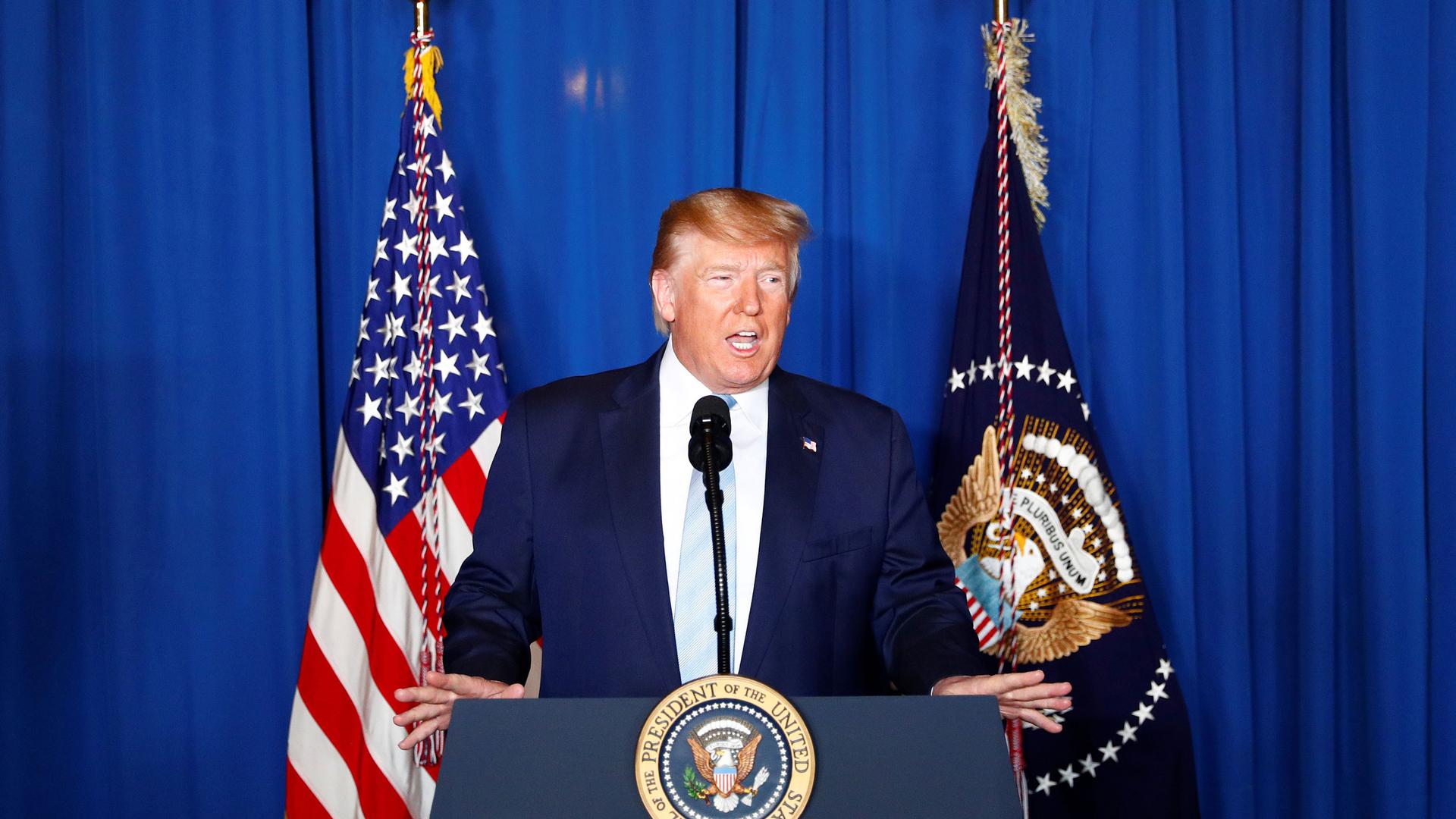
Trump authorizes an overnight airstrike that kills Iranian Gen. Qasem Soleimani without congressional approval.
“We took action last night to stop a war. We did not take action to start a war,” Trump said in a statement following the attack.
Political opponents disagreed, arguing the action could lead to a military conflict in the Middle East.
Thousands of US troops are set to be deployed to the region.
Tim Kaine (D-VA) introduces a resolution in the Senate “to direct the removal of United States Armed Forces from hostilities against the Islamic Republic of Iran that have not been authorized by Congress.”
Jan. 2: Defense Department warning
US Defense Secretary Mark Esper warns the US may take preemptive action to protect American lives from expected attacks by Iran-backed militias.
Jan. 1: Withdrawal from embassy
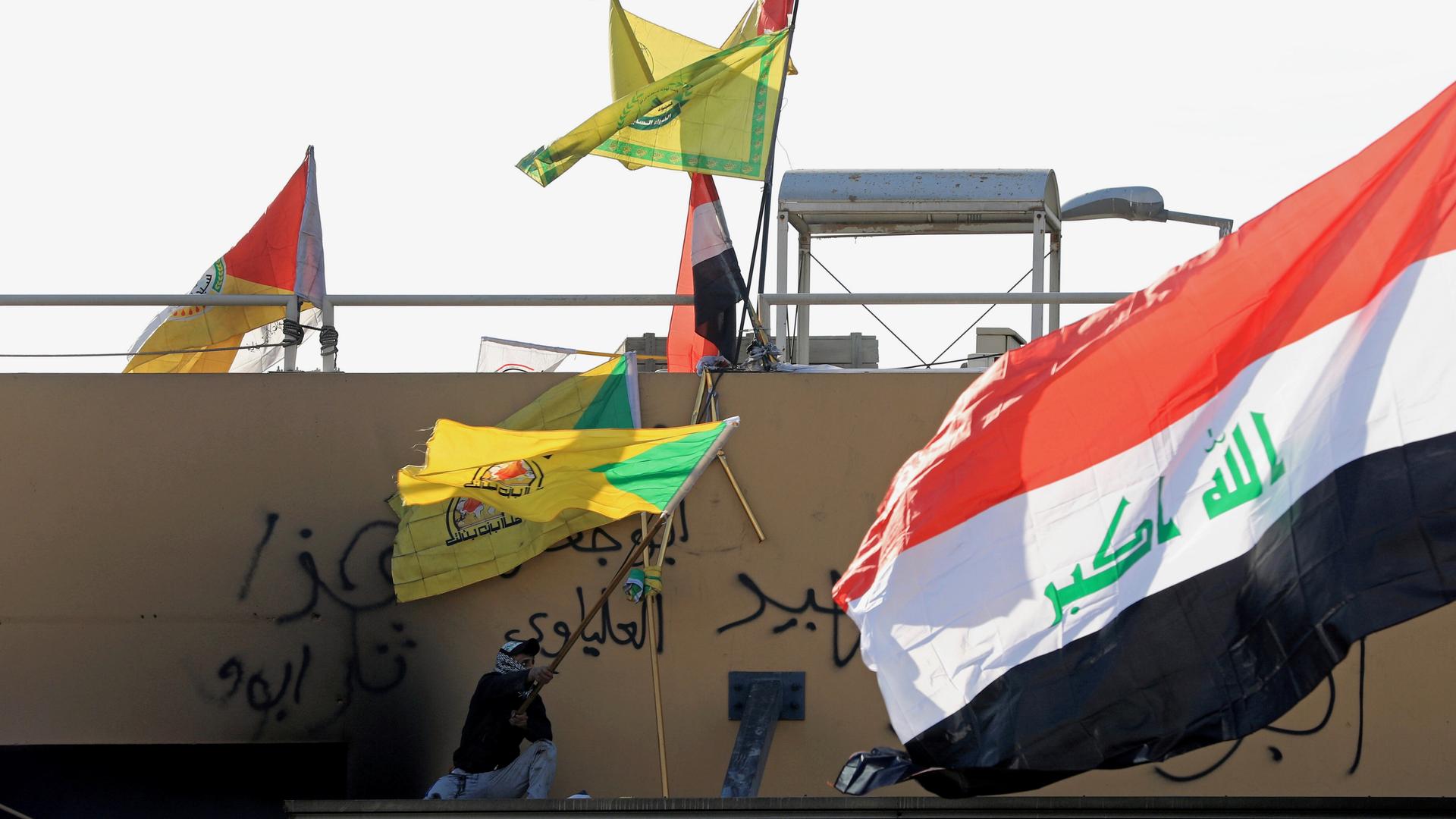
Iran-backed paramilitary groups, who have been protesting for a second day at the US Embassy in Iraq, tell their supporters to withdraw from the perimeter of the compound in Baghdad.
Dec. 31: Attack on US Embassy in Iraq
Iranian-backed militiamen launch an attack on the American Embassy in Baghdad. The embassy’s outer perimeter is stormed by demonstrators angry at US airstrikes against an Iran-backed group that killed at least 25 fighters. Protesters occupy a reception area of the embassy. Some of the attackers are carrying distinctive yellow flags picturing a raised fist holding an AK-47 — the emblem of Iranian-backed group, Kataib Hezbollah.
Related: Kataib Hezbollah attacked the US Embassy in Baghdad. Who are they?
Dec. 29: F-15 bombings kill 25
In response to the Dec. 27 rocket attack on Kirkuk, F-15 warplanes bomb three sites in Iraq — the city of al-Qaim and two sites in Syria’s Euphrates River Valley. At least 25 fighters are killed and 55 wounded.
US officials announce the targets are tied to Kataib Hezbollah, and include weapons storage sites and command posts used to coordinate attacks against coalition troops.
Dec. 27: US civilian contractor killed
A US civilian contractor is killed as more than 30 rockets are fired at a military base near Kirkuk, in northern Iraq. Four American service members are wounded, as are two Iraqi servicemen. The base is operated by Iraq, but serves American and foreign contractors working with Iraqi service members.
Washington blames Iranian-backed Kataib Hezbollah for the attack.
Dec. 11: Official warns of increased attacks
Two Katyusha rockets — originally Soviet World War II weapons — land near Baghdad International Airport.
A senior US military official says Iranian-backed groups are increasing attacks on bases hosting US troops in Iraq. “There is a point at which their actions change things on the ground and make it more likely that some other actions, some other choices made — by somebody, whether it’s them or us — will escalate unintentionally.”
The military official says Iranian-armed militias were approaching a red line where the coalition would respond with force, and “no one will like the outcome.”
Dec. 9: Rockets strike base
Four Katyusha rockets strike a base near Baghdad International Airport, wounding five members of Iraq’s elite Counter-Terrorism Service. US officials say forensic analyses of the rockets and launchers point to Kataib Hezbollah and Asaib Ahl al-Haq, Iranian-backed Shiite militia groups. No group claims responsibility for the attack.
Earlier in 2019: Tensions rise
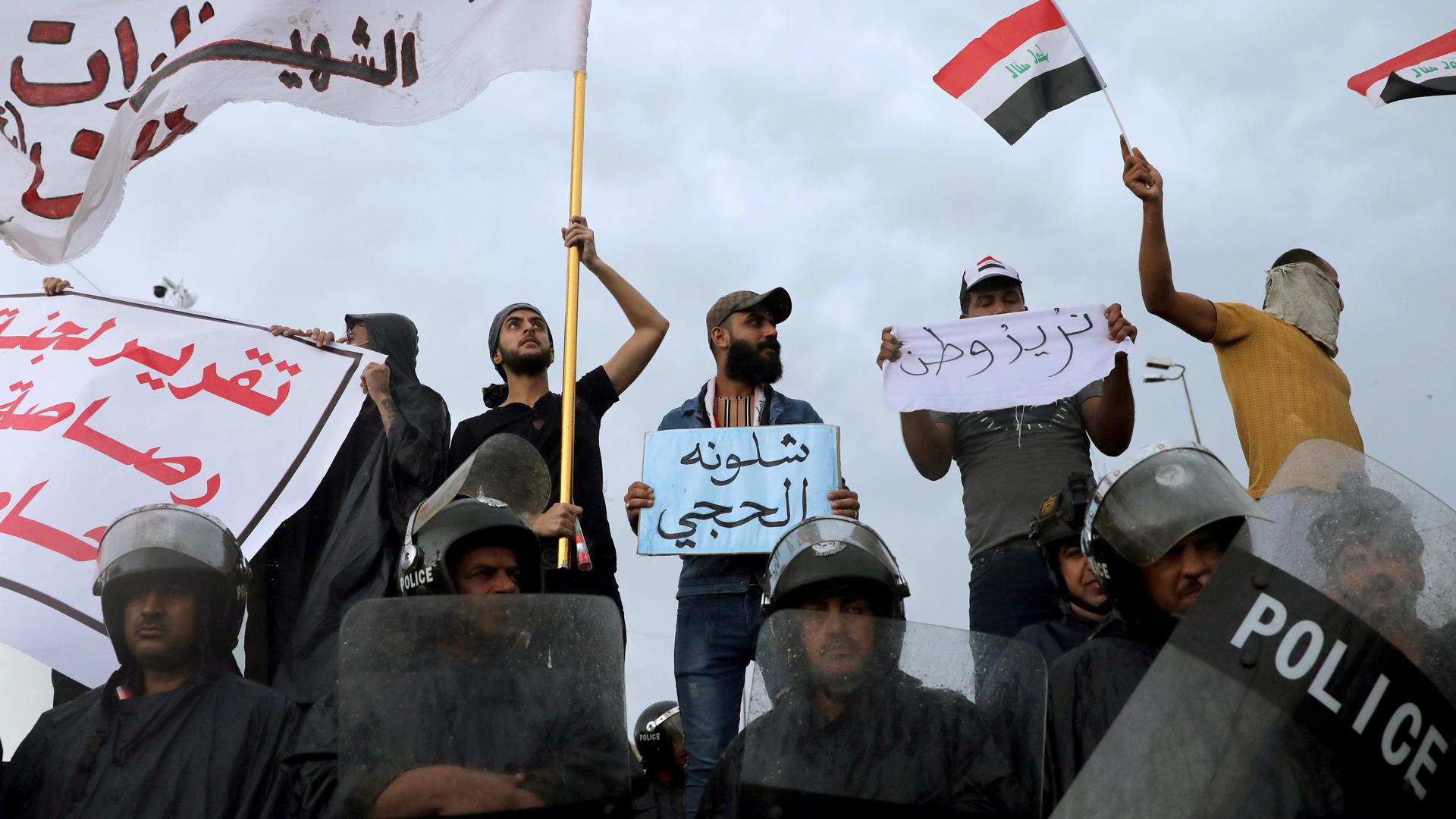
Iraq’s Prime Minister Adel Abdul Mahdi resigns in November under pressure from mass anti-government protests, but continues in a caretaker capacity. One of the issues that Iraqis are protesting is creeping Iranian influence in the country.
Related: Iraq protests are about ‘justice and dignity,’ says Iraqi writer Sinan Antoon
Throughout the spring and summer, Iran carries out a series of attacks on oil tankers in the Persian Gulf region. It is also believed to be behind the September attacks on oil installations in Saudi Arabia.
Related: What do attacks on Saudi oil facilities mean for US-Saudi relations?
In May, exactly one year after Trump pulls the US out of the Iran nuclear deal, Iran announces it will relax some of the curbs the deal imposed on its nuclear program.
Related: Nuclear deal rollback won’t get Iran a weapon, but it’s not an empty threat
In April, the US designates the Islamic Revolutionary Guard Corps a “terrorist organization.” Prior to his assassination, Soleimani was a major general in the corps leading its Quds Force — a paramilitary arm working in extraterritorial military and clandestine operations.
Related: Calling the Iranian Revolutionary Guard a ‘terrorist organization’ is risky, but nothing new
Reuters contributed reporting.
